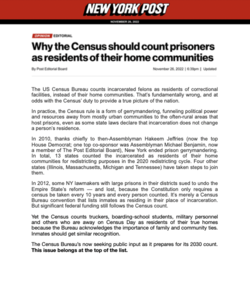New York Post editorial shows diversity of support for ending prison gerrymandering
Yet another paper urges Census Bureau to put the issue at the top of its list of changes.
by Mike Wessler, December 6, 2022
As the Census Bureau wrapped up its first public comment period in its planning process for the 2030 Census, an important — and to many, unexpected — voice called on it to finally end prison gerrymandering. In an editorial, The New York Post, which is owned by News Corp — the same company that owns Fox News — called on the Bureau to finally count incarcerated people as residents of their homes instead of in their prison cells.
In its editorial, the Post notes that the Census Bureau’s practice of counting incarcerated people as residents of prisons is “a form of gerrymandering.” It explains that this practice gives extra political power to communities that host prisons at the expense of everyone else. The paper also points out that the Bureau fails to count incarcerated people the same way it does truckers, boarding-school students, military personnel, and others away from home on Census Day.
Some may be surprised that a paper like the Post, which has often taken conservative stances on issues related to crime and incarceration, would join the chorus of voices that have called for an end to prison gerrymandering. However, a closer examination of the history of this issue (including this 15-state summary of editorials and news articles presented to the Census Bureau in 2014) shows it has long received support across the country from both sides of the political spectrum, including.
- Legislation ending prison gerrymandering often garners bipartisan support in states that fall across the full spectrum of party control, from Massachusetts, to New Jersey, to Tennessee.
- More than 200 rural communities that host prisons have taken action to address this problem in their local districts; and
- And most recently, the choice to count incarcerated people at home has received unanimous and bipartisan support from Commission members in Montana.
Redistricting is a notoriously rancorous process, so how has addressing prison gerrymandering managed to avoid being bogged down in partisan political fights?
On a practical level, elected officials — particularly in local government — have experienced the distortive effects of prison gerrymandering firsthand. And, as a matter of principle, the New York Post put it bluntly and eloquently when it said the practice is “fundamentally wrong, and at odds with the Census’ duty to provide a true picture of the nation.”
In closing its editorial, the Post said, “(prison gerrymandering) belongs at the top of the list” of issues the Census Bureau should address in the 2030 count. We disagree with many of the stances the paper has taken on many issues, but on this one, they took the words right out of our mouths.




